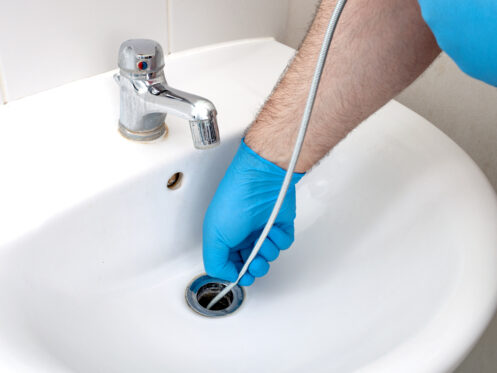Pouring drain cleaner down a sink, toilet or shower is the first thing most people do when their plumbing gets clogged. In most cases, a drain cleaner can eliminate the clog and allow water to drain properly in just a few minutes. The only issue is that drain cleaners aren’t usually safe for your Nanaimo plumbing. It’s especially not safe to use with a septic system. In this article, we’ll explain why that is and discuss what steps you should take when dealing with a clog instead of using a drain cleaner.
How Drain Cleaner Works
There are several different types of drain cleaners, but they all work in a similar way. One type is enzymatic drain cleaner, which contains bacteria and special enzymes that slowly dissolve grease and other organic materials. This type of drain cleaner is usually marketed as all-natural and can work well for cleaning grease and scum out of sinks, showers and floor drains. However, enzymatic drain cleaners are mostly used for preventative maintenance to keep drains clean and generally won’t work to unclog a drain.
Chemical drain cleaners contain either highly acidic chemicals like hydrochloric or sulfuric acid or highly alkaline chemicals like potassium or sodium hydroxide. The chemicals in acidic drain cleaners quickly break down and dissolve organic materials like hair, food scraps, paper products, etc. It typically takes a short amount of time for the chemicals to break down any materials stuck in a drainpipe so that the water in the pipe begins to drain.
Crystal drain cleaning products contain alkaline chemicals like sodium hydroxide (lye) and work slightly differently than liquid drain cleaners. Alkaline chemicals are also extremely caustic or corrosive and quickly start eating through solid materials stuck within a drain or drainpipe. The difference is that these alkaline chemicals produce an exothermic reaction when they meet water. Exothermic means that a large amount of heat is given off because of the reaction. This heat is why crystal drain cleaners are usually more effective at clearing stubborn clogs since the heat essentially causes hair, grease and other solids to melt.
The Impact Drain Cleaner Has on Pipes and Septic Systems
When dealing with a clogged drain or toilet, the first thing any reputable plumber will tell you is to avoid using a drain cleaner. Using an enzymatic drain cleaner every month or so can help prevent buildup inside pipes and prevent drains from smelling. The fact that these products only contain natural enzymes and bacteria also means that they won’t damage your plumbing or your septic system.
Chemical drain cleaners, on the other hand, should always be avoided since the chemicals they contain are caustic enough to damage your drains and pipes. Crystal or alkaline drain cleaners are even worse since they produce enough heat that they can cause PVC drainpipes to expand or warp, which can lead to the pipes leaking.
While we recommend avoiding the use of drain cleaner in any plumbing system, you shouldn’t use it if your building has a septic system. The way that septic systems treat wastewater is that the bacteria colony inside the septic tank feeds on organic materials like human waste and toilet paper. It breaks these solids down into a thick sludge. Some waste byproducts remain in the water that drains out of the septic tank and into the leach field any time you use your plumbing, but this remaining waste then gets broken down and treated by bacteria in the soil.
The issue with using drain cleaner or any other chemicals like bleach is that the chemicals can end up harming much of the bacteria in the septic tank. Some of the chemicals will also end up draining out into the leach field and killing off some of the bacteria in the soil as well. Under normal circumstances, the bacteria colony in a septic tank or leach field stays healthy since new bacteria are continually introduced from the human waste that gets flushed into the septic system.
The problem is that chemicals will remain in the septic tank and soil for a long time and interfere with the bacteria’s ability to reproduce. If there aren’t sufficient bacteria in a septic tank, the solid materials won’t get broken down nearly as quickly. That means the solids can quickly start to fill up the tank, resulting in it needing to be pumped out much more frequently. Most septic tanks only need to be pumped every three to five years. Your tank could end up needing to be pumped after only a year if you introduce lots of chemicals to it. That’s why, instead of using a drain cleaner, it’s best to call a plumber if you can’t clear a clog with a plunger.
Yellow Submarine Plumbing & Rooter is a locally owned, full-service plumbing company serving customers in Nanaimo and throughout Central Vancouver Island. We offer expert drain cleaning, rooting and septic system services, and our team is ready to help with all your home’s plumbing needs. No matter what plumbing or septic service you need, give us a call, and we’ll ensure the job gets done quickly and correctly.



